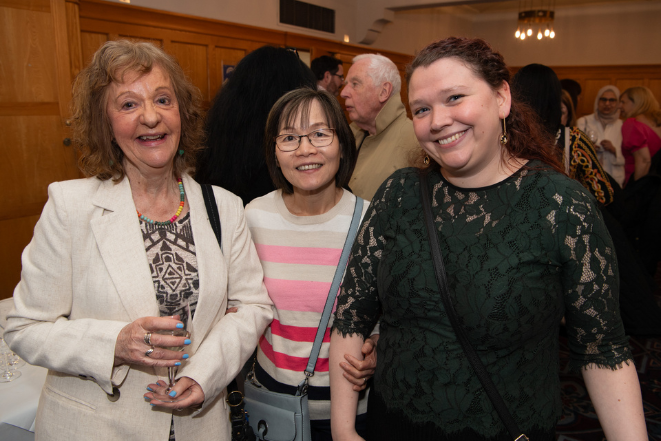In what medium was your story presented in?
I wrote the narrative myself and wanted to use it in a short film where I tell my story in a voiceover. Karen Kinghan was a film maker engaged by the project to manage the film side of that and Louise McIvor as the creative writing tutor checked over the written work we produced. Louise checked over what I had written, and she told me that there was no need to make any changes. I provided some photographs and then Karen made the video using her expertise and ideas about how it could come together, while I recorded the story as a sound file.
Again, just like with ‘Photovoice’, Tess wanted to protect the participants and individual contributions were anonymised. I took the pseudonym ‘Antonia Summer’. I chose ‘Antonia’ to honour my grandmother, who was a refugee after the First World War, she arrived in Germany in 1919 from Poland. I chose ‘Summer’ because I believe that it reflects my personality.

Do you think there was a community aspect created by these particular people coming together?
It was really wonderful, actually that was one of the best things about the project. I only knew a couple of people in the project and some I knew by sight but I didn’t know their stories. And they had so many amazing stories. There was so much positivity, so much adventure, so much strength, and I got a lot out of listening to everyone talking about their journey..
What did you get out of the project?
I think the project concentrated on older women because the combination of being older and being a migrant tends to mean that we become quite invisible in Northern Irish society. We tend to get passed by, every now and again people looking at us, and question us why we are here, but that is about it.
We felt very strongly that it was a very positive and life affirming project, and I, certainly, felt that wit helped to build a kind of new and strong sisterhood. You might say that most of the people involved could be understood as to be on the margins of Northern Irish society. Many are involved in community building and giving back to society but at the grassroots level.
I think there was sense in which this project allowed the people participating in it to feel a sense of strength being built out of it.

Why do you say that?
This requires a bit of explanation.
Some people when they came here, they spent most of their time in the home. They were home-makers. That might mean that they were a bit isolated from engaging with Northern Irish society. Others were part of their community groups, part of the Chinese community, the Polish community or the Indian community for example. So they might be quite connected with people from a similar background, but not so connected with the wider society.

When I first came here I didn’t know if there were any other German people here, but there were and I found them. For me, though, it wasn’t that important to celebrate particular traditions, or to be with my German compatriots that much. I occasionally go to the ‘Germans in Belfast’ meetings, maybe twice a year. However, I know that it is welcoming to anyone who wants to speak German for leisure and some of the organisers organise festivals and things like that.
When I first arrived in Northern Ireland my children were 4 and 1 years old, so we prioritised English in the home because we wanted them to be connected to society here. We had my husband’s family supporting us. Both boys later learned German at school and they took German A ‘Levels, but that keeping up their German wasn’t the key thing for us or them but now I am glad they were able to keep learning German at school. I teach German Business Communication, and I am a trained translator and interpreter. My mother tongue is now my bread and butter. I know that if my boys have enhanced their career changed by having developed their language skills to a high level.
And at this stage, for me as well as for most migrants, or incomers as I prefer, maintaining the original language and culture plays an important part, with all the aspects of the lives we have left behind. However, I don’t walk around in traditional costume or follow very specific cultural traditions apart from the German Advent and Christmas tradition (a real fir tree to be brought into the house on Christmas Eve only along with gift-giving).
The ’Translating Age’ project allowed us to reflect on our individual experience over the years, to see ourselves at a certain stage in our life and to ‘translate’ and share this inner experience into some sort of art project. It shows how closed in we were in our communities but now we have grown beyond them, and by sharing that journey we can connect with the wider community and be seen.
If you would like to learn more about the Translating Age Project see the link below
